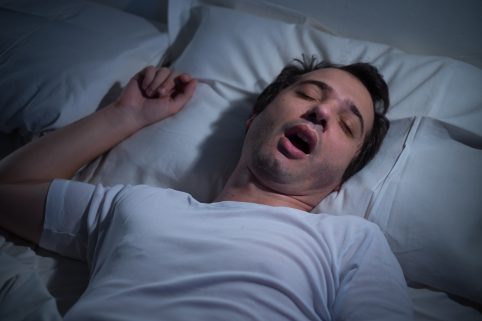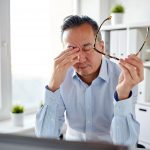Last updated on April 28th, 2023 at 04:05 pm
Do you feel tired during the day, sleepy, have trouble concentrating?
Do you wake up with a headache?
Has your bed partner complained about your snoring?
Have you ever woken up choking, gasping for breath?
Are you overweight?

We ask these questions because your answers are important. If you’ve answered “Yes” to them, you likely have a condition known as Obstructive Sleep Apnoea (OSA). This is a very serious sleep disorder that causes you to stop breathing during sleep.
When you stop breathing, your brain and body become oxygen-deprived. This causes you to wake up. In some cases, it may happen just a few times during the night. Other people may experience several hundred such awakenings during one night.
This oxygen deprivation, countless times every night, affects your overall health. If you already have health problems like heart disease or diabetes, they will worsen if you have OSA. You could even have a heart attack or stroke because of this condition.
That’s why it is critical to follow your doctor’s orders and get further testing for Obstructive Sleep Apnoea.
At-home sleep test
An at-home sleep test is the first step to see if you have this OSA condition.
This simple screening test is called Overnight Oximetry. You will perform this test in your own home. First, you will receive a machine that measures the oxygen level in your blood as well as your heart rate. You will wear a simple device that measures your oxygen while you sleep for one or two nights.
A team of trained NHS physiologists will analyse your test results and advise you whether you need further sleep apnoea testing.
Visit this site to learn more about the Home Sleep Test for Sleep Apnoea: https://cpap.dev2024.intushealthcare.com/shop/home-sleep-apnoea-test.html
Overnight testing at a sleep centre
If the sleep analysts have determined you need further testing, it’s time to have your breathing tested overnight in a local sleep centre.
The highly-trained health care professionals in these sleep centres will run your tests while you sleep in their facility. They will ensure the equipment provides accurate results. Every person who is tested in a sleep centre is tested using safe, hygienic equipment, including a disposable mouthpiece.
The staff will make every effort to keep you comfortable through the night of your test. While it won’t be home, they will help you get adjusted to your new surroundings.
To begin, the sleep specialists will ask about your medical history and sleep apnoea symptoms. They will also provide a physical examination, measuring your height and weight to determine your body mass index — and will measure your neck circumference. These are all factors in Obstructive Sleep Apnoea.
You will then schedule your overnight stay in the sleep centre. With the information they get, they can perform multiple sleep analyses that inform your doctor about your sleep apnoea diagnosis.
Keep this in mind:
- Your doctor will use the test results as well as your medical history, symptoms, examination results, X-rays and scans to develop your treatment plan.
- As each person is different, and you may need fewer or more tests. You may need a specific test just once, or it may need to be repeated. This can be necessary to monitor changes over time or to observe your body’s response to treatment.
- Your health care professional will explain your test results to you. Ask all your questions if you don’t understand. It’s your right to learn all you can about your health.
If your doctor feels it is necessary, you may need more sleep apnoea testing. This can include a respiratory sleep test, polysomnography, and/or an OSLER test.
Respiratory sleep test
This is another specialized sleep test to diagnose Obstructive Sleep Apnoea (OSA). While you sleep, you’ll wear equipment that records your oxygen levels, heart rate, breathing, and snoring.
Your doctor may need to know your carbon dioxide levels while you sleep. For this, you will wear a small clip in your earlobe (it’s not bothersome). You will also have a blood gas test when you wake up in the morning.
Polysomnography
Polysomnography is another more complex sleep analysis test, designed to:
- assess your heart function and breathing – measuring your air flow, chest wall motion, oxygen levels and heart activity
- assess sleep phases and wakefulness – measuring your brain waves, eye movements and muscle movements
- record video and audio footage whilst you sleep
Polysomnography is necessary when basic tests haven’t provided clear results. It’s also useful if you make abnormal movements or do strange things while you’re asleep. Some equipment will be attached to your body to take the measures as you sleep.
If necessary, your sleep specialist may ask you to stay in hospital after the overnight stay for a sleep latency test. This involves napping for periods of 20 to 30 minutes at set times.
Also, your sleep specialist may want to measure your alertness during the day and how easily you fall asleep. For this, a ‘maintenance of wakefulness test’ may be performed after your overnight stay. You’ll be asked to stay awake as long as possible while sitting still in a quiet, relaxing, semi-darkened room.
OSLER test
An Oxford sleep resistance (OSLER) test measures the time you can stay awake during the daytime. You will be asked to lie propped up in a quiet darkened room. You will be asked to push a button every time you see a red light to test your alertness.
Your sleep specialists will keep you comfortable
Keep in mind that these tests are necessary so your doctor understands what is happening when you sleep. These tests will help you get the treatment you need. Having a condition like Obstructive Sleep Apnoea is not healthy, as it takes a toll on your body.
With these tests, your doctors will know how to help you. Then you get the rest you need to stay healthy.
There’s another big benefit. Your bed partner will appreciate it when you get treatment, as the snoring will stop. Everyone in your family will feel better rested, healthier and happier.
CPAP Therapy: Solution for a good night’s sleep
If your sleep tests indicate that you do have Obstructive Sleep Apnoea, your doctor will likely talk to you about CPAP therapy.
CPAP stands for Continuous Positive Airway Pressure. It works by blowing air into the user’s airway, which creates positive pressure. This helps keeps the airway open and free of obstructions such as loose tissue.
It is the primary treatment method for Obstructive Sleep Apnoea.
CPAP is a therapy for OSA; it is not a cure. Wherever possible it should be used whenever the patient sleeps, as without it OSA will return instantly. It has been compared to water; you can drink water every day, but the day you stop you will dehydrate.
Numerous clinical studies have proven the effectiveness of CPAP. Sleepiness, and the risk of heart problems are reduced by the therapy. Therefore most OSA diagnoses have CPAP has the first treatment option.
Learn more about CPAP:
https://cpap.dev2024.intushealthcare.com/information/cpap-advice

